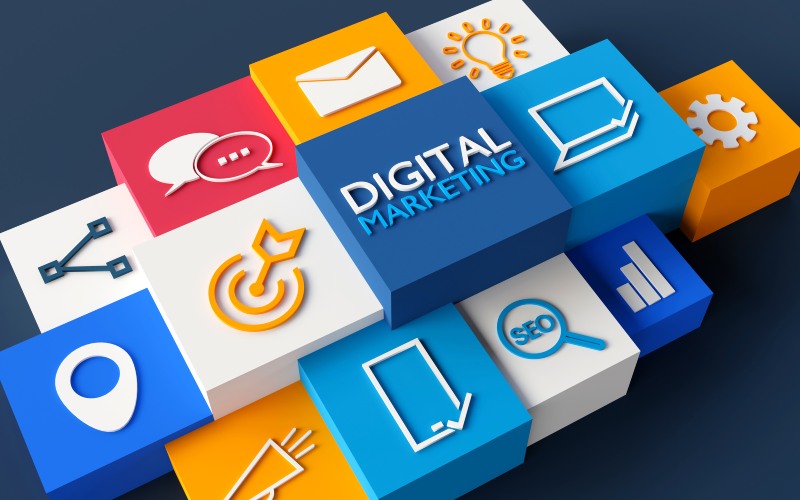In today’s interconnected world, digital marketing is no longer just a trend; it’s an essential discipline for businesses of all sizes, from startups to multinational corporations. The ability to effectively reach, engage, and convert audiences online is a highly sought-after skill, leading to a booming demand for digital marketing professionals. For aspiring marketers and career changers, online digital marketing courses offer a flexible and comprehensive pathway to acquire these vital skills and thrive in this dynamic industry.
Why Choose Online Digital Marketing Training?
- Flexibility and Convenience: Online courses allow you to learn at your own pace, from anywhere, and at any time. This is ideal for students, working professionals, and those with other commitments. You can tailor your study schedule to fit your lifestyle.
- Access to Global Best Practices: Many online platforms collaborate with international universities and industry leaders, providing access to cutting-edge strategies and global best practices that might not be readily available in traditional offline settings.
- Cost-Effectiveness: Online courses often come at a fraction of the cost of traditional classroom-based training, as they eliminate expenses related to commuting, accommodation, and sometimes even printed materials.
- Practical, Hands-on Learning: The best online courses integrate practical exercises, real-world case studies, and simulations, allowing learners to apply theoretical knowledge immediately. Many also provide access to industry-standard tools (like Google Ads, Google Analytics, social media management platforms).
- Industry-Recognized Certifications: Many online courses culminate in certifications that are highly valued by employers, demonstrating your proficiency in specific digital marketing domains.
Key Modules Covered in Online Digital Marketing Courses:
A comprehensive online digital marketing course typically covers a wide range of topics, ensuring a holistic understanding of the digital landscape. Key modules often include:
- Introduction to Digital Marketing: Understanding the fundamentals, evolution of marketing, digital vs. traditional marketing, inbound vs. outbound marketing, and the digital marketing ecosystem.
- Website Planning and Development: Basics of website creation (often using platforms like WordPress), understanding user experience (UX) and user interface (UI) principles, and website architecture.
- Search Engine Optimization (SEO):
- On-Page SEO: Keyword research, content optimization, meta tags, heading structures, internal linking.
- Off-Page SEO: Link building strategies, online reputation management, local SEO (Google My Business).
- Technical SEO: Site speed optimization, mobile-friendliness, XML sitemaps, robots.txt.
- Search Engine Marketing (SEM) / Paid Advertising (PPC):
- Google Ads: Setting up and managing search campaigns, display campaigns, video campaigns (YouTube Ads), shopping ads, keyword targeting, ad copywriting, bid strategies, and conversion tracking.
- Social Media Advertising: Running ads on platforms like Facebook, Instagram, LinkedIn, and Twitter, understanding audience targeting, ad formats, and budgeting.
- Social Media Marketing (SMM):
- Organic Social Media: Content creation for various platforms, community management, building an engaged audience, social media strategy development.
- Influencer Marketing: Understanding how to collaborate with influencers to promote brands.
- Content Marketing: Developing a content strategy, different content formats (blogs, videos, infographics, podcasts), content creation, content promotion, and storytelling.
- Email Marketing: Building email lists, designing effective email campaigns, automation, segmentation, and analyzing email performance.
- Web Analytics: Using tools like Google Analytics (GA4) and Google Search Console to track website traffic, analyze user behavior, measure campaign performance, and generate actionable insights.
- Mobile Marketing: Understanding mobile-first strategies, mobile website optimization, app marketing, and SMS marketing.
- E-commerce Marketing: Strategies specific to online stores, product listing optimization, customer retention, and conversion rate optimization (CRO).
- Affiliate Marketing: Understanding the principles of affiliate marketing and how to leverage it.
- Emerging Trends: Introduction to AI in digital marketing (e.g., using AI for content creation, ad copy), conversational commerce, voice search optimization, and marketing automation.
Prominent Online Digital Marketing Course Providers:
Digital marketing education landscape is rich with options:
- Google Digital Marketing & E-commerce Professional Certificate (Coursera): Highly recommended for beginners, covering core digital marketing skills and e-commerce fundamentals, with practical projects.
- UpGrad: Offers advanced certificates in Digital Marketing and Communication (often in collaboration with universities like MICA), known for comprehensive syllabi and career support.
- Simplilearn: Offers a wide range of digital marketing courses, including a Post Graduate Program in Digital Marketing, often in partnership with universities.
- HubSpot Academy: Offers excellent free certifications in various aspects of digital marketing (e.g., Content Marketing, Email Marketing, Digital Marketing Fundamentals).
- Digital Marketing Institute (DMI): A globally recognized certification body, offering various professional and specialist courses online.
- Udemy & edX: These platforms host countless courses from individual instructors and universities, allowing for flexible, self-paced learning on specific topics.
Career Prospects After an Online Digital Marketing Course:
Completing a comprehensive online digital marketing course opens doors to a wide array of job roles, including:
- Digital Marketing Executive/Manager
- SEO Specialist
- Content Marketing Strategist
- Social Media Manager
- PPC Specialist / SEM Analyst
- Email Marketing Specialist
- Web Analytics Expert
- E-commerce Specialist
- Digital Copywriter
The digital marketing industry is experiencing rapid growth, with a constant demand for skilled professionals. An online digital marketing course provides the essential knowledge and practical skills to enter, thrive, and advance in this exciting and ever-evolving field.





